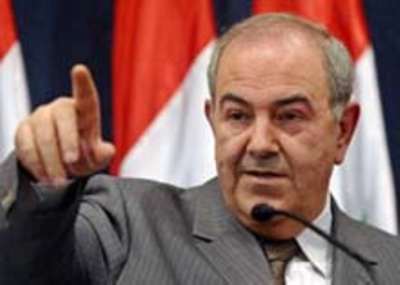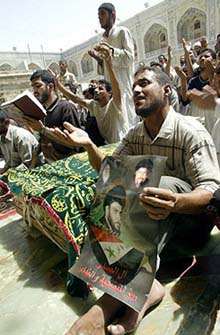
september 2004
News reports have implied that the US forces were seeking to eradicate Sadr forces in Najaf once and for all, citing Iraq 's highest-ranking Shiite scholar, Grand Ayatollah Ali Al-Sistani, suddenly leaving for London for "heart treatment" Friday.
Iraqis
Denounce US-made 'Bloodbath' In Najaf

THE OUTBREAK:
Occupation forces fired at Shiite marchers, who were peacefully protesting the crushing of two fellowmen by a U.S. tank on Saturday, April 3, the arrest of Sadr’s top assistant Sheikh Mostafa Al-Yaqoubi and a ban on Al-Houza newspaper, Sadr’s mouthpiece, Aljazeera satellite channel reported.
The U.S.-led occupation authorities claimed Sunday the arrest was in connection with the murder of a rival Shiite scholar last year.
"Yaacubi was detained yesterday in connection with the murder of Ayatollah Abdul Majid al-Khoei," AFP quoted a senior occupation official as saying.
Aljazeera correspondent said the occupation’s attack was so fierce that he compared what he saw to the 1982 Israeli atrocities in the Palestinian refugee camps of Sabra and Shatila in Lebanon.
He saw dozens lying wounded on the ground, including Shiite scholars, amid the sound of explosions and gunfire on the main highway out of the holy city.
Ambulances rushed to the scene
and the shooting lasted for more than an hour as U.S.
helicopters and jets flew overhead.
*****
By Samir Haddad, Mazen Ghazi, IOL Correspondents
BAGHDAD, August 8 (IslamOnline.net) – As fighting kept raging in the holy Iraqi city of Najaf between US occupation forces and Mehdi Army fighters, loyal to firebrand Shiite leader Moqtada Sadr, Sunni and Shiite leaders slammed what they saw as a "bloodbath" and called upon the international community to step in to rein the Americans.
This came as Iraqi Interim Prime Minster Iyad Allawi arrived Sunday, August 8, in war-torn Najaf and called on fighters loyal to Sadr to leave the city as soon as possible.
Commenting on the escalating fighting in Najaf dragging on for the fourth day running, Shiite and Sunni leaders slammed what they said were "horrific practices" of the occupation forces against the Iraqi citizens in the Shiite holy city and elsewhere across Iraq.
"Such incidents are similar
to the days of the former regime when Saddam Hussein used
to commit mass killings while they (the Americans) make
public funerals" the Association of Muslim Scholars
press spokesman sheikh Mohamed Bashar Al-Faidi told
IslamOnline.net.

Al-Faidi branded as "genocide and barbaric" the practices of the American forces in Najaf and all across other Iraqi cities, noting that the Americans are using "terrorism" against the Iraqi people to stop resistance against the occupation forces.
The Muslim Brotherhood, for its part, condemned the terrible practices of the American forces in Iraq .
The group said in a statement, a copy of which was obtained by IslamOnline.net, that occupation was the main reason behind the ongoing state of violence and chaos in the war-torn country.
The Shiite Political Council also described the practices of the occupation forces in Iraq as aiming to harm the Iraqi national unity, not only Sadr loyalists.
The council called for taking specific steps to bring an end to the ongoing aggressions of the occupation forces against the Iraqi citizens, including boycotting the Iraqi national conference, due in mid-August, if a peaceful solution to current aggressions was not reached.
Najaf has been the scene of almost daily clashes between some 2,500 US troops and Sadr supporters.
Surprise Visit
In a surprise visit to Najaf Sunday, Allawi called Mahdi Army fighters to leave the city as soon as possible.
"We hope that this thing ends as soon as possible," Reuters news agency quoted Allawi as saying.
"I believe gunmen should leave the holy sites ... quickly, lay down their weapons and return to the rule of order and law."
Allawi had signed Saturday, August 7, a 30-day amnesty law, in a step seen as a bid to persuade the resistance groups to lie down arms against the occupation forces.
The amnesty law came on the third day of bloody clashes that erupted in Najaf between the US-led occupation forces and the Mahdi Army.
 The US military had said Friday
that 300 fighters of the Mahdi Army, loyal to Shiite
cleric Muqtada Al Sadr were killed in the bloody clashes
with the US forces erupted in the Iraqi city of Najaf , a
claim which was denied by the Mahdi army.
The US military had said Friday
that 300 fighters of the Mahdi Army, loyal to Shiite
cleric Muqtada Al Sadr were killed in the bloody clashes
with the US forces erupted in the Iraqi city of Najaf , a
claim which was denied by the Mahdi army.
The latest clashes of Najaf are described as the worst since a truce deal was stricken between the US forces and the Mahdi Army.
"The amnesty covers those Iraqis who have not committed killings, who have been deceived into joining the resistance and who are now convinced that they made a mistake. We welcome them," said Georges Sada, spokesman for Prime Minister Ayad Allawi.
"Anyone who committed the crime of murder will not be covered by the amnesty."
Iraqi officials had said the amnesty might extend to those who killed US and other occupation troops. US officials said an early draft contained ambiguous language on that issue, but later drafts ruled it out.